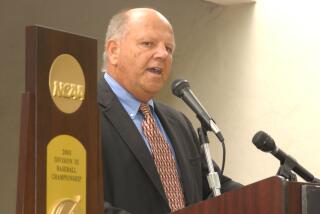Homer D. Chapman, 106; Expert in Soils, Care and Feeding of Citrus
- Share via
Homer D. Chapman once quipped that “the only experience I’d had before with citrus was oranges in the Christmas stocking.”
Chapman, whose initial citrus experience came as a small boy in Wisconsin during the first decade of the 20th century, grew up to make substantial contributions to citrus nutrition and soils research -- work that added to the economic growth of the citrus industry in California and around the world.
Chapman, a former director of the University of California’s Citrus Experiment Station in Riverside and a founding faculty member at UC Riverside, died of natural causes Monday in an Irvine retirement home. He was 106.
A pioneer in the development of leaf and tissue analysis for diagnosing the nutrient status of citrus trees, Chapman served as chairman of the Department of Soils and Plant Nutrition from 1938 to 1961 and directed the Citrus Experiment Station from 1951 to 1952. Before the establishment of UC Riverside in 1954, the department was located at the station.
“His methods of evaluating soils for citrus nutrition are still being used today,” Walter Farmer, a soil scientist and chairman of UC Riverside’s department of environmental sciences, told The Times on Friday.
“The reason Riverside became the center for citrus production is it has a Mediterranean climate that’s similar to where citrus is grown in many parts of the world -- Spain, Egypt, Israel -- and his work helped establish our prominence as a world leader in citrus culture,” Farmer said.
“Homer was among a number of agriculture researchers working on issues related to citrus culture, such as pest management, who helped make Southern California a center for citrus production,” Farmer said. “What they learned here was adopted by other citrus-growing areas.”
During Chapman’s tenure as department chairman, “the department grew enormously,” Farmer said. “That’s another area where his exceptional leadership really contributed to the growth in the area of soil science.”
Born in Darlington, Wis., in 1898, Chapman studied agriculture at the University of Wisconsin-Madison. After earning his doctorate degree in 1927, he moved to Riverside as a researcher with the Citrus Experiment Station, which is now called the Agricultural Experiment Station and is part of UC Riverside.
Although forced to take mandatory retirement in 1966, Chapman continued working as a consultant and attended scientific conferences around the world.
He wrote the “Mineral Nutrition of Citrus” chapter in both editions of Volume II of “Citrus Industry,” published in 1948 and 1968. The five-volume “Citrus Industry” is considered the bible for the industry and citrus researchers.
Chapman lived in Riverside from 1927 to 1993, when he and his wife, Daisy, moved to a retirement home in Irvine. She died in 1999 at age 96. The couple had been married 70 years.

